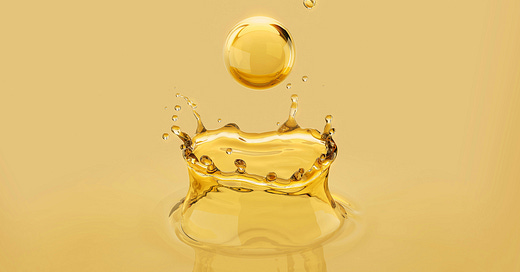Hey there, and happy Labor Day to everyone in North America!
This holiday is always bittersweet for me, as someone who loves summer and can’t bear to see it end (even if unofficially)—and yet I also tend to get a burst of creative inspiration around this time when I think about the new season and getting back to work.
This year I’ve had the pleasure of working with
on podcast strategy, and now I’m super excited about some of the things we have in store for this season of Rethinking Wellness. Not only are there some fantastic interviews coming up, but we’re also making a few changes that I think you’re going to love.The biggest one is that I’ve decided to devote more of my time this season to essays, Q&As, and other “written” pieces (with audio versions too), which are the things that seem to resonate most with you. I’ll be able to delve even more deeply into topics, and I’m also experimenting with spreading out some pieces across multi-part series, so that we can really get into some big and meaty ideas. I’ve realized that just because this is a “weekly” newsletter/podcast doesn’t mean that we have to move on to entirely new ideas each week, or that I have to cram everything I want to say about a given subject into one piece. (Other writers have realized this already, but I’m late to the party lol.) If something calls for more depth and expansion across multiple installments, we can do that here, too!
Another thing that’s really been working is the link roundups—you seem to enjoy reading them, and I like having an outlet for quick takes and analysis of newsy items that might not make it into a full Q&A or essay. So I’m going to be doing those more often, starting with two this month. Feel free to send me links of things you want to see covered/critiqued!
All of that is kicking off in the coming weeks, so stay tuned!
Meanwhile, today I want to share a Q&A I did last year that explored how to think about viral wellness information, and whether seed oils are as bad for you as online sources claim. A few people have asked me about seed oils recently, and I’ve seen some fearmongering messages about them making the rounds online, so I thought this was a timely re-share. (Everyone can see my answer about virality, and paid subscribers get to read the whole thing.) I hope you find it useful in navigating the back-to-school onslaught of weird wellness trends.
Today’s first question isn’t from a reader but from a journalist who asked me to weigh in on an influencer making bizarre and baseless claims that people could fix their eyesight by, among other things, using essential oils (which the influencer conveniently sells as a rep for an MLM).
The reporter used some of my quotes in her piece, which is worth reading in its entirety if you’re curious about the truly weird stuff some wellness influencers are doing. But I also want to share some of my thoughts that didn’t make it into the article, with the hope that they might help you respond the next time you encounter viral wellness misinformation out in the wild.
Of course it goes without saying that I don’t think there’s any merit to this influencer’s claims, or to any of the similarly strange wellness trends I’ve been asked about over the years. But I also hesitate to comment on the specifics with stories like this, because responding to and reporting on bizarre social-media claims only tends to amplify them.
Social algorithms reward engagement, which includes likes, clicks, and shares, but also angry comments and quote-tweets and stitches criticizing the original poster. And it just so happens that the types of content that drive the most engagement tend to involve elements of novelty, controversy, and moral outrage.
Misinformation often hits all those notes, which is why we see so many influencers going viral with totally out-there and non-evidence-based claims about health and wellness. Many viewers embrace those claims, but many others find them outrageous and express their anger and disgust in hate-posts, spreading the misinformation to their own audience in the process. Even traditional media articles calling out the BS can sometimes serve to increase its reach.
As a general principle, when you see an influencer making claims that seem to turn conventional medical and scientific wisdom on its head, it’s a good idea to be very, very skeptical. If they’re making these claims on social media—and especially if they’re young and conventionally attractive—they’re probably going to get some traction and may go viral, but that doesn’t mean what they’re saying is valid. Often it means the opposite—and that the influencer knows how to game the algorithm (whether they’re doing it consciously or not).
I think we’d all do well to start treating virality as a red flag when it comes to health and wellness claims.
I know there’s a temptation when you see blatant misinformation on social media to repost and critique it (or flood the poster with angry comments and DMs). But I think it’s important to resist that urge, because that tends to make the dubious content spread further by giving it more algorithmic juice.
Instead, you might consider stepping back from social media, not turning to social platforms for health and wellness information, and learning to quickly move on from dubious claims rather than getting sucked in (I find the SIFT method helpful for this, which we’ll discuss in more detail in my answer to the second question below).
The pull to wade into the specifics can be strong—the human brain loves a good story. But maybe we can use these moments as a reminder to resist giving our attention to the latest viral wellness trend, and to devote it to things that matter more to us.
Thanks to the reporter who asked this question, and thanks to all the free subscribers for reading! Paid subscribers can stick around for the bonus Q&A about seed oils, and everyone can ask their own questions for a chance to have them answered in an upcoming newsletter.
Speaking of specifics, the question below contains the name of a blog that promotes misinformation about seed oils while seeming to be science-based. I debated cutting out the name, but I think in this case it’s worth leaving in to help illustrate an essential step in the SIFT process. I did edit the question for length and to remove some unnecessary details.
Seed Oils
Hi Christy,
Over the past few years I have read a lot of scientific-based content about how an excess of polyunsaturated fatty acids (PUFA, found in industrial seed oils such as canola or sunflower oil) can harm our health. Specifically, there is a science-based blog called Fire in A Bottle putting forward the theory that an excess of PUFA has metabolic effects that contribute to long-term health issues.
Aside from the anti-processed-food bias and anti-fat bias which helps the anti-seed-oil conversation to gain popularity, I can’t help feeling convinced to some extent that there is some truth in the claims that these polyunsaturated fatty acids are not the best choices for us to use if we can avoid them. I have been using olive oil, butter, and other fats like tallow.
This hasn’t been addressed adequately elsewhere as people focus on side issues like “nuts and seeds are nutritious,” or “some essential fatty acids happen to be polyunsaturated,” both of which are true, but which don’t address the widespread usage of canola and sunflower oil in modern cooking and ingredients.
Would very much appreciate your thoughts.
—Jenny













